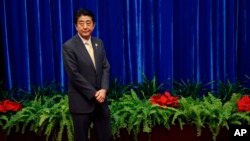Japanese Prime Minister Shinzo Abe is dissolving his government, calling for new elections to secure public support for more economic reforms to stimulate growth. The moves come after news that Japan’s economy unexpectedly fell into recession.
Abe announced that Japan’s lower house of parliament will be dissolved on Friday, November 21, setting up national elections for sometime in December.
His announcement also delays a planned sales tax hike that was expected to take effect next October, but now likely will be delayed for 18 months.
Seeking a mandate
Abe hopes to win a strong popular mandate in the upcoming elections to pursue his core pro-growth polices known as “Abenomics.” He said Tuesday that if his administration is returned to power, he will not postpone the tax hike again.
Abe came to power in December 2012 with a plan to revitalize the world’s third largest economy. The conservative leader promised to stimulate growth by increasing government spending, keeping interest rates low and easing regulations. And to a certain extent his policies worked. Stock prices and employment increased.
Under pressure from deficient hawks, however -- some within his own party -- he also increased the sales or consumption tax rate last April to bring down Japan’s public debt, which is more than twice its gross domestic product.
Masazumi Wakatabe a Professor of Economics at Waseda University in Tokyo attributes the sudden recession in Japan to the recent tax hike.
“So after the current consumption tax hike on April, the consumption figures have been very stagnating, and also other investment figures have been also not picking up. So that’s the reason I think because consumption and investment compiles [accounts for] almost 80 percent of Japan’s GDP,” said Wakatabe.
Asian slowdown
The slowdown in Japan comes at the same time that China's growth is slowing as the government there tries to make the economy more driven by domestic consumption and less by exports and investment.
A slowdown in Japan’s imports likely will negatively impact the rest of Asia to an extent. Asian stock markets traded lower right after the news broke that Japan was in a recession.
Europe's economy has been stagnant as well. British Prime Minister David Cameron recently warned of a looming second global crash. Writing in a British newspaper he said, “The Eurozone is teetering on the brink of a possible third recession, with high unemployment, falling growth and the real risk of falling prices too.”
And while the British economy is growing, Cameron said, “Wider problems in the global economy pose a real risk to our recovery at home.”
Euro zone storm clouds
Professor Wakatabe said Japan’s recession, by itself, is not likely to cause the world markets to crash.
“I don’t that this slowing down of growth in Japan will spark the global financial meltdown or anything. Japan is important, but Japan is not that important or I don’t think that’s going to happen,” he said.
Although the United States continues to experience positive growth, the weaker global outlook could be a concern if domestic consumption declines.
While Japan’s economic woes may not cause the global system to collapse, Wakatabe said it likely will not be a dynamic force for growth either, at least in the short term.





